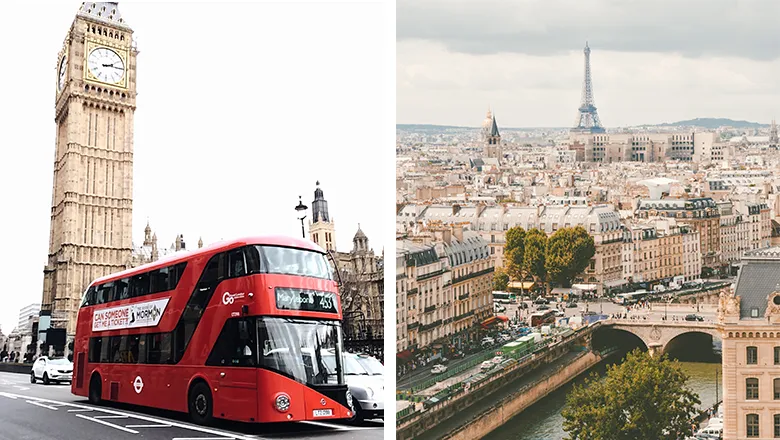17 September 2021
Two cities one tale? How Londoners and Parisians see their cities in light of Covid
Jack Brown and Mark Kleinman
How do residents themselves feel about the challenges and opportunities of living in global cities?

Capitals and Covid: how Londoners and Parisians see their cities in light of the pandemic
Read the research
The great cities of the world have been severely impacted by Covid-19. Indeed, some have even suggested that the return of global pandemics might mean the end of global cities – that small group of highly connected key nodes in the worldwide economic system that has benefitted hugely from global integration over the last few decades. Others point to the fact that these cities have survived plague, war and natural disaster, and have – generally – recovered from these and prospered.
But how do residents themselves feel about the challenges and opportunities of living in global cities? Has the pandemic changed attitudes, or has it reinforced existing ones? King’s College London, the University of Paris and Ipsos MORI researched the attitudes of Londoners and Parisians in November/December 2019, on the eve of the pandemic, and then again in April/May 2021. We found that the two cities shared many characteristics, but also showed important differences. And we also found that some of the changes from pre- to during the pandemic were not perhaps what might have been expected.
Reports of the “death of the city” appear to be exaggerated. We found there was little change from 2019 to 2021 in the share of Londoners and Parisians planning to move out of their city. Despite lockdowns forcing people to spend much more time closer to home over the past year, people’s satisfaction with their local area is largely unchanged from two years ago. Perhaps surprisingly, there has been a considerable increase in satisfaction with local services. Spending more time locally because of the pandemic may have led to some developing a newfound appreciation for their neighbourhoods and the public services they can access nearby. Majorities in both Greater London and Greater Paris now say they’re satisfied with services such as schools, transport and police – a notable increase from 2019.
While there is no sign of a mass exodus from the two cities prompted by Covid, more than two in five Londoners say it is likely that they will leave the city in the next five years, a slight increase from 2019. The proportion of Parisians who say they’ll move out is virtually unchanged from two years ago, at a little under half. In both cities, a desire for a better quality of life is a strong motivator, but people in the two capitals differ on other drivers: Londoners are much more likely than Parisians to cite affordability and the cost of living as key factors, while Parisians are more likely to mention the desire to live in a better physical environment.
Our findings – based admittedly on just two global cities – suggest that we are unlikely to be on the cusp of a major world change from the BC era (Before Covid) to AD (After Density). In both London and Paris, the majority of respondents thought that their city would recover from the pandemic, although most saw this as a slow process rather than a rapid bounce back. And optimism that one’s own standard of living would improve over the next five years actually increased slightly in both cities.
How might the two capitals change in the future? Large majorities in both say they’re concerned about climate change, air quality and the loss of green spaces, although Londoners and Parisians differ on some of the policy solutions to address these kinds of issues. Londoners are keener on reallocating space away from vehicles to cyclists and walkers, as well as on the idea of days when only electric or hybrid vehicles are allowed into the city centre. In Paris, a lack of green spaces for leisure and exercise is seen as a bigger issue than it is in London, with more than a quarter of Parisians saying such spaces are not sufficiently available to them.
So, while there’s confidence that London and Paris will recover and almost certainly maintain their position in the hierarchy of global cities, building back better is likely to mean building back greener. This in turn implies changes to national policies, and probably more central government funding. This might prove problematic, as capital cities are often disliked, seen as absorbing too much of the nation’s resources. Around four in 10 people in both capitals think that their city receives roughly the “right” amount of public expenditure. But one in three Londoners think their city gets more than its fair share of central government spending compared with other parts of the country. This compares with about one in eight Parisians who think the same about their city. The politics of post-Covid recovery could be every bit as challenging as the economics.


